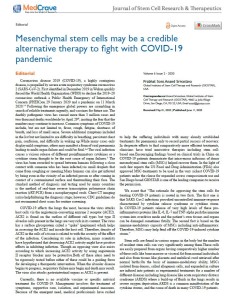Mesenchymal Stem Cells May Be A Credible Alternative Therapy To Fight With COVID-19 Pandemic
Coronavirus disease 2019 (COVID-19), a highly contagious disease, is propelled by severe acute respiratory syndrome coronavirus 2 (SARS-CoV-2). First identified in December 2019 in Wuhan quickly forced the World Health Organization (WHO) to declare the 2019–20 coronavirus outbreak a Public Health Emergency of International Concern (PHEIC)on 29 January 2020 and a pandemic on 11 March 2020.1-3 Following the emergence global powers are scrambling in search of reliable treatments urgently, and vaccines for future use. The deathly pathogenic virus has caused more than 3 million cases and two thousand deaths worldwide by April 29th, inciting the fear that the numbers may continue to increase. Common symptoms of COVID-19 include, but are not limited to, fever, cough, fatigue, shortness of breath, and loss of smell sense. Severe additional symptoms included in the list but not limited to are difficulty in breathing, persistent chest pain, confusion, and difficulty in waking up.While many cases only display mild symptoms, others may manifest a form of viral pneumonia leading to multi-organ failure and could be fatal.4-6 The viral infection causes a vicious release of different proinflammatory cytokines or a cytokine storm thought to be the root cause of organ failures.5 The virus has been recorded to spread between humans following a close contact with someone who has been infected,via small droplets that come from coughing or sneezing.Many humans can also get infected by being even in the vicinity of an infected person or after coming in contact of a contaminated surface and thentouching their face. The standard method of diagnosis and testing used by many countries is the method of real-time reverse transcription polymerase chain reaction (rRT-PCR) from a nasopharyngeal swab. Chest CT imaging isalso helpfulduring the diagnosis stage; however, CDC guidelines do not recommend chest scans for routine screening.
COVID-19 affects the lungs the most, because the virus attacks host cells via the angiotensin-converting enzyme 2 receptor (ACE2). ACE2 is found on the surface of different cell types but type II alveolar cells present in the lungs are very rich in its content. The virus has a surface glycoprotein called a “spike” (peplomer) which helps in accessing the ACE2 and invade the host cell. Therefore, density of ACE2 in the cells of a tissue is related to with the severity of the effect of the infection. Considering its role in infection, many scientists have hypothesized that decreasing ACE2 activity might have positive effects in inhibiting infection. Though an opposing view also exists according to which increasing ACE2 activity by using angiotensin II receptor blocker may be protective.Both of these ideas need to be rigorously tested before either of these could be a guiding force for developing a therapeutic intervention. When the alveolar disease begins to progress, respiratory failure may begin and death may result. The virus also attacks gastrointestinal organs as ACE2 is present.
Currently, there is no available vaccine or specific antiviral treatment for COVID-19. Management involves the treatment of symptoms, supportive care, isolation, and experimental measures. Because of the emergent need, medical professionals have rushed
Approval of MSCs for therapeutic is gaining acceptance around the globe.In Japan, MSCs have been approved for the treatment of another clinical condition called graft-versus-host disease.There are other such pending approvals in the US also as a number of clinical trials starting to test the benefits of MSCs for treating COVID-19 are at different stages.Many scientists, on the basis of the immune- modulatory ability of MSCs and other circumstantial evidence, think that MSCs should alleviate the symptoms in COVID-19 patients. It was evident by the Chinese study, which was reported in “Aging and Disease” last month also.The findings based on seven COVID-19 patients who received intravenous infusions of MSCs recovered successfully and were discharged from the hospital by the end of the 14-day observation period. In contrast, of the three patients of the control group receiving regular treatment, all of whom had severe disease, one died, one developed ARDS, and one achieved a stable condition.7,8
Many scientists see that MSCs could be a very promising approach for treatment of COVID-19 patients though the findings are based on a small number of subjects.Other scientists also think that the report demonstrates that the MSCs are not only well received by the patients but also impart a great therapeutic relief. Following the recent approval by FDA of the treatment for extreme cases and trials together with the recruitment of COVID-19 patients to existing MSC trials for ARDS around the world a significant amount of data will demonstrate the therapeutic value of allogenic stem cell-based treatments in COVID-19 patients. Reviewing all the developing data, we suggest that clinicians may safely use MSCs to manage those patients who are in severe condition. MSCs may also be used as a credible preventive therapy to make the immune system ready to fight the virus in case of any possible COVID-19 infection.
Prabhat Soni, Anand Srivastava
Global Institute of Stem Cell Therapy and Research (GIOSTAR),
USA
Correspondence: Anand Srivastava,
Global Institute of Stem Cell Therapy and Research (GIOSTAR),
4660 La Jolla Village Drive, San Diego, CA, 92122, USA,
Email: anand@giostar.com
Received: May 01, 2020 | Published: June 11, 2020
References
1. Symptoms of Coronavirus. U.S. Centers for Disease Control and Prevention (CDC).
2. Q&A on coronaviruses (COVID-19). World Health Organization (WHO).
3. Hopkins, Claire. Loss of sense of smell as marker of COVID-19 infection. Ear, Nose and Throat surgery body of United Kingdom.
4. Hui DS, I Azhar E, Madani TA, et al. The continuing 2019-nCoV epidemic threat of novel coronaviruses to global health—The latest 2019 novel coronavirus outbreak in Wuhan, China. Int J Infect Dis. 2020;91:264–266.
5. Puja Mehta, Daniel F McAuley, Michael Brown, et al. COVID-19: consider cytokine storm syndromes and immunosuppression. The Lancet. 2020;395(10229):1033–1034.
6. “Q&A on coronaviruses”. World Health Organization (WHO).
7. Gu Jinyang, Han Bing, Wang Jian. COVID-19: Gastrointestinal manifestations and potential fecal-oral transmission”. Gastroenterology.
8. Leng Zikuan, Zhu Rongjia, Hou Wei, et al. Transplantation of ACE2- Mesenchymal Stem Cells Improves the Outcome of Patients with COVID-19 Pneumonia[J]. Aging and disease. 2020;11(2):216–228.



